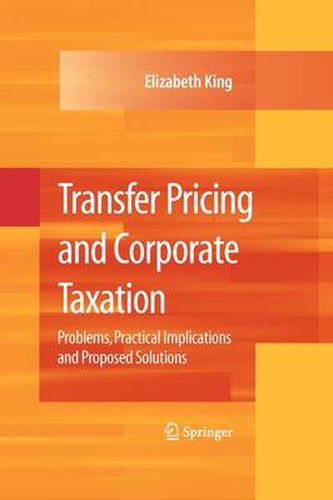Readings Newsletter
Become a Readings Member to make your shopping experience even easier.
Sign in or sign up for free!
You’re not far away from qualifying for FREE standard shipping within Australia
You’ve qualified for FREE standard shipping within Australia
The cart is loading…






This title is printed to order. This book may have been self-published. If so, we cannot guarantee the quality of the content. In the main most books will have gone through the editing process however some may not. We therefore suggest that you be aware of this before ordering this book. If in doubt check either the author or publisher’s details as we are unable to accept any returns unless they are faulty. Please contact us if you have any questions.
National tax authorities individually determine multinational ?rms’ country-speci?c tax liabilities by applying one or more sanctioned transfer pricing methodologies. These methodologies are founded on basic assumptions about market structure and ?rm behavior that are rarely empirically valid. Moreover, for the most part, the transfer pricing methodologies now in vogue were developed before the Internet became a dominant factor in the world economy, and hedge and private equity funds transformed ?nancial and commodities markets. For these reasons, multinational ?rms are unable to accurately anticipate their tax liabilities in individual countries, and remain at risk of double taxation. Uncertainties in corporate tax liability are extremely costly, both for individual corporations and from an economy-wide perspective. Firms pay exorbitant fees to have tax attorneys, accountants and economists prepare the documentation required by tax authorities to substantiate their intercompany pricing practices and defend their tax positions on audit. Corporate tax liabilities are also potentially much higher than they would be under a more transparent and predictable transfer pricing regime (due to the potential for double taxation and penalties), and investors’ returns are reduced accordingly. The FASB’s Interpretation No. 48, Accounting for Uncertainty in Income Taxes (released on July 13, 2006), has motivated multinational ?rms to increase their reserves substantially (in many cases at the insistence of their au- tors), reducing the total funds available for productive investment. 1 The current transfer pricing regimes are embodied in the OECD Guidelines, individual OECD member countries’ interpretations thereof, the U. S.
$9.00 standard shipping within Australia
FREE standard shipping within Australia for orders over $100.00
Express & International shipping calculated at checkout
This title is printed to order. This book may have been self-published. If so, we cannot guarantee the quality of the content. In the main most books will have gone through the editing process however some may not. We therefore suggest that you be aware of this before ordering this book. If in doubt check either the author or publisher’s details as we are unable to accept any returns unless they are faulty. Please contact us if you have any questions.
National tax authorities individually determine multinational ?rms’ country-speci?c tax liabilities by applying one or more sanctioned transfer pricing methodologies. These methodologies are founded on basic assumptions about market structure and ?rm behavior that are rarely empirically valid. Moreover, for the most part, the transfer pricing methodologies now in vogue were developed before the Internet became a dominant factor in the world economy, and hedge and private equity funds transformed ?nancial and commodities markets. For these reasons, multinational ?rms are unable to accurately anticipate their tax liabilities in individual countries, and remain at risk of double taxation. Uncertainties in corporate tax liability are extremely costly, both for individual corporations and from an economy-wide perspective. Firms pay exorbitant fees to have tax attorneys, accountants and economists prepare the documentation required by tax authorities to substantiate their intercompany pricing practices and defend their tax positions on audit. Corporate tax liabilities are also potentially much higher than they would be under a more transparent and predictable transfer pricing regime (due to the potential for double taxation and penalties), and investors’ returns are reduced accordingly. The FASB’s Interpretation No. 48, Accounting for Uncertainty in Income Taxes (released on July 13, 2006), has motivated multinational ?rms to increase their reserves substantially (in many cases at the insistence of their au- tors), reducing the total funds available for productive investment. 1 The current transfer pricing regimes are embodied in the OECD Guidelines, individual OECD member countries’ interpretations thereof, the U. S.